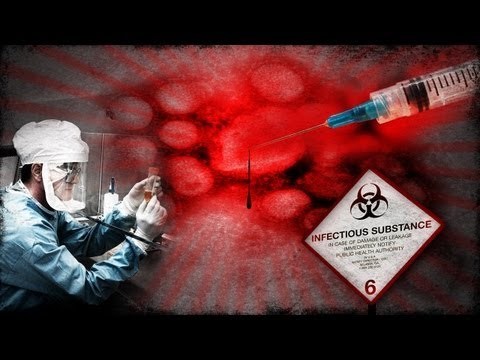When the Ebola outbreak began, Dr. Arntzen was using these tobacco plants to attempt to amplify antibodies that had come from mice, in order to use a form of this as a vaccine for humans that had become infected. He found that inserting the antibodies into the tobacco plants, as it had always been done to form a vaccine, was a slow-going process. He revolutionized the field by using viruses to infect the tobacco plants instead. By hiding the antibodies within the virus, the tobacco plants began to produce an exponential amount of antibodies as the infection spread throughout the plant. These antibodies went on to form the vaccine ZMapp, which is an extremely promising drug against Ebola. Although not yet FDA approved, this alternative way of producing the vaccine could save many lives all over the world as Ebola continues to infect others.
As a project that had begun after the 9/11 attacks with the thoughts of the nation on terrorism, Dr. Arntzen and his team were able to quickly produce antibodies in tobacco plants in the event that there was an attack via bioterrorism. Conveniently, they had produced antibodies for Ebola in the years following 9/11 that were used to treat a handful of patients in the 2014 outbreak.
Dr. Arntzen is creative through his discovery of this extremely useful innovation and this creativity appears to stem from his personality and how he approached the problem. In watching videos of how he accomplishes his work, I am able to identify a handful of Sternberg's personality characteristics. Dr. Arntzen falls under the integration and intellectuality category as he listens to multiple approaches to the problem and then discovers the best solution through a combination of these thoughts. He also falls under the decisional skill and flexibility category. When he speaks about his research team and how the discovery occurred, he indicated that the research went back and forth quite a few times, in slightly different directions before they discovered the right path to quickly reproduce this antibody for Ebola. However, he continued to follow his gut instinct in order to make the correct discovery of the insertion of the virus into the tobacco plant.
When thinking of a creative person, many people will not have a scientist come to mind. However, if we did not have people like Dr. Arntzen creatively discovering new ways to quickly and effectively produce vaccines, many more people could be at risk for certain diseases. Remember that scientists can be creative too, just not in what most would define as "conventional."

https://vimeo.com/127319051 (video on development of vaccine)
https://vimeo.com/127319986 (video on working with others)
http://image.slidesharecdn.com/molecularpharming-140221195629-phpapp01/95/molecular-pharming-7-638.jpg?cb=1393012656
http://visual-science.com/feature-img/ebola-virus/ebola-virus.png
https://40.media.tumblr.com/0911b56259c40375debd926bd1cad56d/tumblr_mskvqvHVmZ1ss6ffzo1_500.jpg
http://www.fastcompany.com/3045741/most-creative-people-2015/meet-ebolas-soft-spoken-plant-loving-arch-nemesis
Hi Nicole,
ReplyDeleteReally insightful post. I had no idea that vaccine research for Ebola had begun even before the 2014 outbreak. It also helps one realize how sometimes fear can be a great motivator and source of inspiration. It reminds me of a Matt Damon quote from a favorite movie of mine, Interstellar. Damon (Dr. Mann) says, "You're feeling it, aren't you? The survival instinct. That's what drove me. It's what drives all of us. And it's what's gonna save us. Cause I'm gonna save all of us. For you, Cooper." On another note, being able to think outside the box is critical for medicine. We have bodies that are governed by biological rules and restrictions, so being able to navigate around these is crucial to treating disease and malfunctions. Furthermore, I think there will be an even greater necessity for creativity when treating antibiotic-resistant strains of bacteria in the future.
This is a very interesting innovation, and I am extremely pleased to learn an effective vaccine for Ebola has been developed. Dr. Artzen is indeed a creative person. He utilized a process that has been around for years to increase the speed with which Ebola antibodies could be produced. Geneticists have been utilizing E. coli and bacteriophages, bacteria viruses, for years to study specific genes and the genes' protein products. Nonetheless, to reiterate, it is extremely exciting to learn that this technology has been utilized in a creative way to manufacture a vaccine that could save thousands of lives.
ReplyDeleteThis was a really interesting story! I don't know a ton about biology, but I do remember the recent Ebola scare, and how terrifying the virus was. It's amazing to read about scientists who continue to revolutionize their fields in this day and age in order to make a difference in the whole world. And as far as the creativity of scientists, though it may be easy to attribute creativity with musicians and artists, I agree that scientists can have "unconventional" creativity. The innovative work they do can most certainly be considered creativity.
ReplyDeleteThis is a very interesting post about thinking of other uses for the tobacco plant. It is ironic that something so deadly like tobacco can be used to help us fight off something even deadlier. It is, however, very concerning that we knew about something like ebola, but it was still so devastating to many countries. Hopefully we will better be able to use that knowledge next time there is a major outbreak.
ReplyDeleteI am completely astounded. You are right in saying that when I hear the word "creative," a scientist is not the first person to pop into my head. However, this blog has helped me open up about the different kinds of creativity. I also often think of how the Ebola scare has faded over time. I, very recently, even heard of some student joking about Ebola. However, without the silent heroes behind the scenes for controlling the breakout, this could have ended horribly. I think it is unfortunate that the media is not focusing on these amazing innovations in the medical field. Great blog!
ReplyDelete